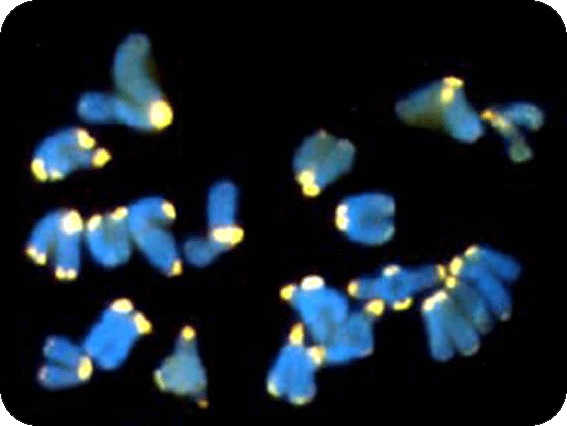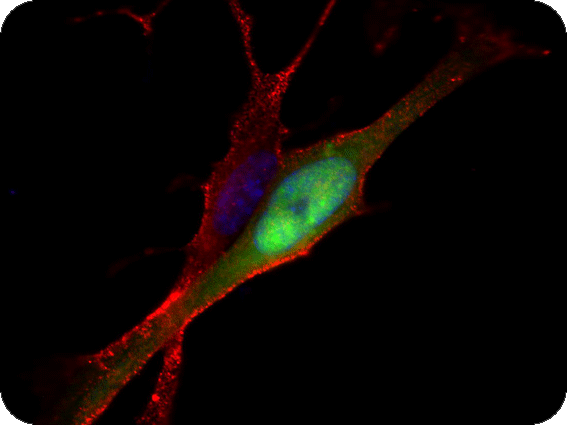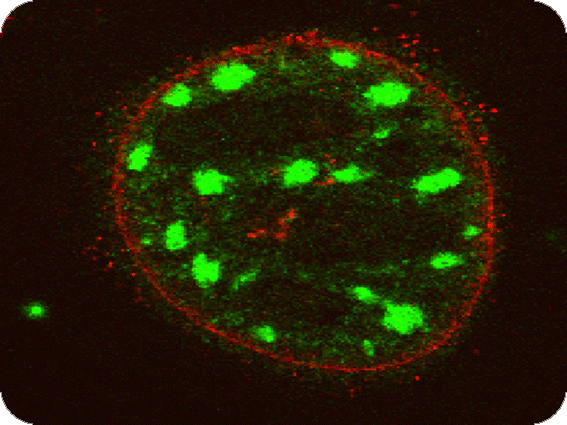Lectures and practical classes on this website are divided into four main areas that the Department covers in its teaching: (Genetics, Molecular Biology, Microbiology a Virology + Other Areas); However, this division is approximate, and many courses span multiple areas or even overlap with courses taught by other departments. The links lead to the Study Information System, where you can find detailed descriptions, syllabi, and other relevant information. The majority of lectures and courses are taught in Czech only; those taught in English are marked in bold within the following paragraphs.
Genetics
 There are two main introductory lectures on genetics given in the Czech language. For students not in teaching tracks, the lectures Genetics (MB140P47; previously - before the credit increase - MB140P17) Principles of Genetics (MB140P16) are offered. These two lectures differ in their scope and content - Genetics is recommended for students focusing more on molecular biology fields, while Basics of Genetics is tailored for students in evolutionary biology and taxonomy. These lectures can be taken in the first year of study, though a good knowledge of high school genetics and cell biology is expected and the teachers mostly recommend to sign for them in the second year.
There are two main introductory lectures on genetics given in the Czech language. For students not in teaching tracks, the lectures Genetics (MB140P47; previously - before the credit increase - MB140P17) Principles of Genetics (MB140P16) are offered. These two lectures differ in their scope and content - Genetics is recommended for students focusing more on molecular biology fields, while Basics of Genetics is tailored for students in evolutionary biology and taxonomy. These lectures can be taken in the first year of study, though a good knowledge of high school genetics and cell biology is expected and the teachers mostly recommend to sign for them in the second year.
The students in the Science Bachelor's programme, or those participating in the Erasmus+ activities, should enroll in Principles of Genetics (MB140P16E), which is taught in English and covers the main topics of classical and molecular genetics, including theoretical problem-solving and microscopic examination. The Czech students in the Biology for Teachers programme should take Genetics for the students of Biology Education programmes (MB140P11; previously MB140P15U) taught in Czech.
There are practical classes corresponding to the Czech lectures MB140P16 and MB140P11: Principles of genetics: course (MB140C16) and Genetics for the students of Biology Education programmes - a Practical Course (MB140C15U), which complement the respective lecture content. A separate intensive Course on general genetics (MB140C15) (also taught only in Czech) is open to all students (no prerequisite or concurrent enrollment in a genetics lecture is required, but students should have a good grasp of basic genetic concepts before participating). This course allows students to apply their genetics knowledge to solve complex problems from various areas of genetics genetiky. Please note that the capacity of this practical course is limited each year!
In addition to these basic genetics lectures and practical classes, the advanced lecture Cytogenetics (MB140P05), is often recommended in the third year of the bachelor's program. It provides detailed coverage of eukaryotic chromosomes and methods for their study. This lecture is accompanied by a one-week course Practical course from cytogenetics (MB140C05) (the capacity of this course is limited each year!). Both the lecture and the course are presented in Czech language.
Molecular Biology
 In their first year, Czech students should attend the Essentials in molecular biology (MB140P71), which provides essential information on nucleic acids, proteins, gene expression, and fundamental methods used in molecular biology. The lecture Molecular Biology (MB140P41) builds on this foundation, focusing more deeply on the mechanisms of gene expression regulation and cellular signaling. For students in Czech teaching programmes Molecular biology for the students of biology education programmes (MB140P20 andMB140P21). The lecture Essentials of Molecular Biology (MB140P71E) is available in English and its explains the basics of molecular biology to the Erasmus+ students or the students enrolled in one of the English-taught study programmes.
In their first year, Czech students should attend the Essentials in molecular biology (MB140P71), which provides essential information on nucleic acids, proteins, gene expression, and fundamental methods used in molecular biology. The lecture Molecular Biology (MB140P41) builds on this foundation, focusing more deeply on the mechanisms of gene expression regulation and cellular signaling. For students in Czech teaching programmes Molecular biology for the students of biology education programmes (MB140P20 andMB140P21). The lecture Essentials of Molecular Biology (MB140P71E) is available in English and its explains the basics of molecular biology to the Erasmus+ students or the students enrolled in one of the English-taught study programmes.
The lecture Genetic Engineering (MB140P36) explores various methods of working with nucleic acids and genetic manipulations in detail; it is typically recommended for the later years of the bachelor's program. Another very useful lecture is Structure and Properties of Biopolymers (MB140P37), which focuses on the properties of nucleic acids and proteins, that are important for their function in living organisms and for their study. Both lectures are given only in Czech.
The one-day Practical course essentials in molecular biology I (MB140C71) complements the lecture MB140P71, offering students practical experience with techniques like polymerase chain reaction (PCR) and other methods for working with nucleic acids. The two-day Practical course essentials in molecular biology II (MB140C72) adds additional techniques, particularly those associated with protein analysis, which students will practice (these two courses are mutually exclusive, meaning students can enroll in either one or the other). Similarly, the Molecular biology for the students of biology education programmes - practical course (MB140C20) allows students in teaching tracks to gain hands-on experience with selected methods used in molecular biology. The advanced two-week Practical Course in Molecular Genetics (MB140C39) (course capacity is limited each year, and students must pass an entrance test!) is primarily intended for third-year students; they will learn both the theoretical principles and practical application of a wide range of basic and advanced molecular biology techniques. Additional specialized courses related to these methods are directly part of the MB140P36 or MB140P37 lectures. All the above mentioned courses are aimed for Czech students. On the other hand, the week-long intensive course Practical Molecular Biology (MB140C35) is taught in English and introduces students to the basic methods used in DNA and protein research. The course Molecular and cellular biology of model organism (MB140C78) is designed as an Oxford-style course, where each student works on their mini-project with the yeast Saccharomyces cerevisiae over the year, receiving truly individual attention from the instructors (course capacity is limited, and there is a test before enrollment).
Microbiology
 The lecture Microbiology (MB140P33), introduces students to essential information about microorganisms (with a particular focus on bacteria), including their taxonomy, cell structure, physiology, and interactions with the environment. This course is usually recommended to Czech students for enrollment in their second year of study, after completing one of the basic cell biology or biochemistry lectures. Its equivalent, Microbiology (MB140P88), is intended for students in teaching tracks and is conducted alongside the version primarily oriented towards students in the Clinical and Toxicological Analysis programme, Microbiology (MB140P26). The English lecture General Microbiology (MB140P88E) is meant for international students.
The lecture Microbiology (MB140P33), introduces students to essential information about microorganisms (with a particular focus on bacteria), including their taxonomy, cell structure, physiology, and interactions with the environment. This course is usually recommended to Czech students for enrollment in their second year of study, after completing one of the basic cell biology or biochemistry lectures. Its equivalent, Microbiology (MB140P88), is intended for students in teaching tracks and is conducted alongside the version primarily oriented towards students in the Clinical and Toxicological Analysis programme, Microbiology (MB140P26). The English lecture General Microbiology (MB140P88E) is meant for international students.
Students can delve deeper into bacterial cells and populations and the processes occurring within them in the lecture Physiology of bacteria I (MB140P34). The lecture Prokaryotic genetics (MB140P13) focuses on the genetic information of microorganisms from the Bacteria and Archaea domains, its specificities, and the rules governing its transfer. This lecture is complemented by a one-week practical course Practical course of genetics of prokaryotes (MB140C13), where students can practice the topics covered in lectures through specific examples (the capacity of this practical course is limited each year!). The content of the lecture Ecology of microorganisms (MB140P73) primarily includes interactions between microorganisms and their environments. All these lectures require at least basic microbiological knowledge and are recommended for students in the later years of their Bachelor’s programmes. In the third year of the Bachelor's programme, students may also enroll in the lecture Biology of the yeasts (MB140P24), which is primarily intended for graduate students and provides a more detailed overview of this group of eukaryotic microorganisms. However, none of the above mentioned lectures is given in English.
An integral part of any variant of the basic microbiology lecture is the accompanying practical classes (in the case of the lecture MB140P88, there is a separate Practical course on microbiology for the students of Biology Education programmes (MB140C88)). Other practical courses in microbiology, recommended as suitable complements to the relevant lectures, include the separate one-week intensive Practical courses of bacterial physiology (MB140C34), where students can practically learn the main methods used to study bacterial metabolism, and the English-taught one-week course Practical course in biology of the yeasts (MB140C24E), where students can try out basic techniques for working with these microorganisms (the capacity of these courses is limited each year!).
Virology
 Two basic virology lectures are offered to Czech undergraduate students: the more extensive Virology - systems on molecular level (MB140P81), primarily for students interested in molecular biology fields, and the half-length Fundamentals of Virology (MB140P75), aimed at those seeking a general overview of virology without delving into molecular biology details. For students in teaching tracks interested in this subject, there is a variant of this lecture, Fundamental virology for teachers (MB140P75U). The English lecture series Molecular Virology: Virus Replication Strategies (MB140P81E), provides international undergraduate students with a brief overview of the nature of viruses, the basic elements of their structure, their history, diversity, taxonomy, pathogenic effects, evolution, and research methods.
Two basic virology lectures are offered to Czech undergraduate students: the more extensive Virology - systems on molecular level (MB140P81), primarily for students interested in molecular biology fields, and the half-length Fundamentals of Virology (MB140P75), aimed at those seeking a general overview of virology without delving into molecular biology details. For students in teaching tracks interested in this subject, there is a variant of this lecture, Fundamental virology for teachers (MB140P75U). The English lecture series Molecular Virology: Virus Replication Strategies (MB140P81E), provides international undergraduate students with a brief overview of the nature of viruses, the basic elements of their structure, their history, diversity, taxonomy, pathogenic effects, evolution, and research methods.
Practical course in virology (MB140C70) is a two-week intensive course (with limited capacity each year!), complementing both main Czech virology lectures and allowing students to familiarize themselves with the main methods and techniques used in virology studies on both practical and theoretical levels (this course is primarily intended for Master's students, but highly motivated Bachelor’s students can apply earlier). The similarly named Practical courses in virology (MB140C74) is a two-day practical course for students attending the MB140P75 lecture, who can try some basic virological laboratory techniques there.
Other Areas
A short introduction to chemistry (MB140P64) lecture is also offered under the Department of Genetics and Microbiology's guidance. This lecture is designed to refresh and supplement high school knowledge of general, analytical, inorganic, and organic chemistry, with a focus on the daily laboratory needs of biologists. It includes practical guidelines and safety rules for working in a chemistry lab.





















